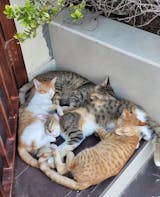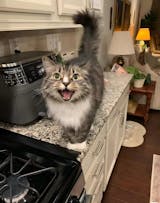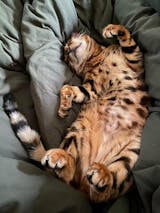August 22 is Take Your Cat to the Vet Day—the perfect reminder to check in on your feline's long-term health. While kittens need frequent vet visits for vaccines and development, adult cats—especially those 5 years and older—still require consistent care to stay happy and healthy.
Why 5+ Cats Need Extra Attention
By the time a cat reaches 5, many owners relax, thinking the "fragile kitten stage" is long behind them. But this is exactly when health risks start to shift. Adult cats are more prone to dental disease, kidney issues, weight gain, and digestive problems like hairball syndrome. Regular vet visits help catch these early, ensuring your cat enjoys a comfortable, active life well into their senior years.
Key Preventive Care for Adult Cats
1. Vaccines & Parasite Prevention
Even if your cat is an indoor cat, vaccines and parasite checks remain important. Core vaccines (such as rabies and FVRCP) protect against serious diseases that can still spread through open windows, other pets, or during boarding. Flea, tick, and worm preventives should be continued year-round to avoid hidden health issues.
2. Dental Health Matters
Dental disease is one of the most common problems in cats over 5. Tartar buildup, gingivitis, and tooth resorption can cause pain and affect eating habits. Regular dental cleanings and at-home brushing can make a huge difference—your vet may recommend annual oral exams to prevent hidden infections.
3. Digestive & Hairball Health
Older cats groom themselves more, which increases the risk of hairballs and digestive blockages. Excessive hair ingestion can stress the stomach and intestines, sometimes leading to vomiting or constipation.
That's where tools like AutoComb, the world's first self-grooming cat brush, help—by encouraging gentle daily grooming, AutoComb reduces excess hair and supports a healthier digestive system, lowering the risk of hairball-related issues.
4. Hydration & Urinary Health
Cats are notorious for not drinking enough water, and as they age, dehydration can lead to kidney strain and urinary blockages. Urinary obstruction (urinary blockage) is a life-threatening condition where a cat cannot pass urine. This causes bladder pressure, toxin buildup, and if untreated, can quickly lead to kidney failure or death.
Tips to encourage hydration ("water hacks" for cats):
-
Add wet food to your cat’s daily diet.
-
Offer homemade chicken breast or tuna broth (unsalted, no seasoning).
-
Use a cat water fountain to entice playful drinking.
-
Mix small amounts of warm water into dry food.
Don't Skip the Annual Vet Visit
By age 5 and beyond, cats should visit the vet at least once a year for a full health exam. This includes bloodwork to check kidney and liver function, dental evaluations, and parasite screening. Preventive care is far easier—and more affordable—than treating chronic illnesses after they've progressed.
Final Thoughts
On this Take Your Cat to the Vet Day, celebrate your cat's health by scheduling a check-up. From staying current with vaccines and dental care to preventing urinary blockages and digestive issues, these small steps add up to years of extra comfort for your feline friend.
And remember—daily habits matter. Tools like AutoComb help your cat stay stress-free, reduce hairballs, and make grooming a natural, healthy routine. Pair that with regular vet visits and mindful hydration, and you'll give your cat the best gift: a long, happy, healthy life.






